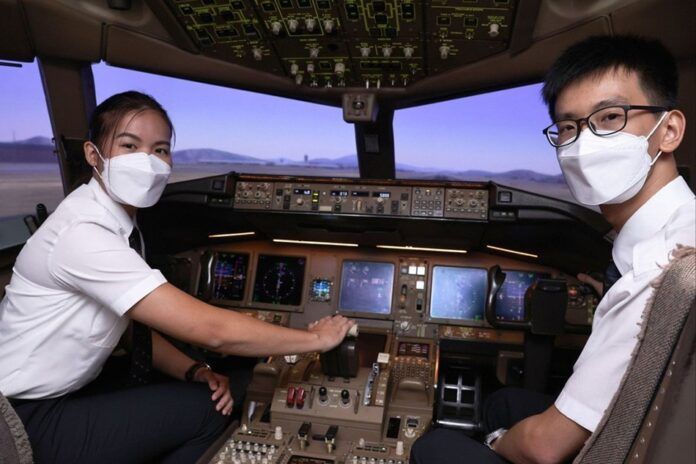Cathay Pacific Airlines has told cadet pilots they will spend up to two months of their training by working at Hong Kong Airport, manning service counters and other jobs to learn about airport operations. The pilots union said they oppose the plan, arguing that issuing boarding passes and tagging baggage does nothing to enhance their training as pilots and may scare away new hires. The South China Morning Post said it’s seen a message from Cathay’s head of pilot training saying the program will start in June and involve two months of “rotational training” at the airport.
Cathay Pacific, once the dominant airline serving Hong Kong and the Pacific region, has suffered from competition and the pandemic in recent years. It’s struggling to recover and hopes to resume 70 percent of its schedule this year. Its cadet program was heralded as a key step in that direction to help solve a mass exodus of pilots who were forced to be in isolation during the pandemic because of Hong Kong’s strict quarantine rules. It now has 2,405 pilots, just 63 percent of its pre-COVID strength.




































Two months may be a bit long but two months spread over several airport jobs may well serve to increase the future pilots’ understanding of passenger/ground handling and help them to handle day-to-day difficulties better. Decades ago the “line boys” connecting the ground power and setting the chocks at Paris CDG used to be pilot academy trainees doing this as part of their “on-the-job training”. Aviation (and commercial aviation even more so) is a team effort and knowing the part of the other team players first-hand is a huge bonus. (This is true for ATC as well. While we might not be allowed to control a sector, just watching TRACON or Tower operations – or trying one’s hand at an ATC sim – will improve the understanding of the challenges involved.)
Spent some time in the Navy TAD to the line shack. Hot, grungy, cold, dirty job, but for those motivated, a great learning experience.
Got to see first hand behind the curtain operations, scheduling and logistics; Who does what and why.
Manning service counters? Ok, maybe. But as the poster above mentioned, working on the line could be invaluable. They tell you it’s going to take 30 minutes to change the Tomato Baffle, and you’ve never seen it done in less than an hour and a half…time to start asking questions.
I reckon these guys are on the money. I wish that a lot more professions required their recruits work at the shop floor for a minimum period before being allowed anywhere near the class room and academic centres.
The bane of my life has been dealing with bureaucrats and regulators, too many of whom haven’t the ability to do what I do, don’t understand what I do but none the less regulate (and interfere with) what I do.
Success in any field requires a team player attitude; too many in our culture think they re above the team and it has consequence.
Two months for young hires will indeed seem like an eternity, but the benefits of that insider perspective will provide lots of valuable insights they can refer to in their future careers as pilots. Great idea.
Cross-training never hurt anybody.
I do turnarounds. One of the first things my guys and I do when we get onsite is get in the truck, work the line, answer the phones in sales; go a mile in the other guy’s shoes.
This experience is great experience.
Surprised this is being argued over.
As a new apprentice fitter at the MRO company I work for they send us round different parts of the business for 6 weeks before we touch the shop floor to allow us to make connections and see how the rest of the company operates. Not sure why rotations would be considered negative for someone new to the industry, surely it’d be a valuable experience as I know it was for me.
I’m a little shocked that the PA would be opposed to any training. Learn from the ground up including all phases of any operations. My boss, the owner of our company, called me one day and asked why did you started in the Paint shop. I explained I could have come in as your IA/QA but had never painted a plane. I knew the “book steps” but wanted to see the ops first-hand. He just laughed. Some could argue it was a waste of two years but what I gained from that 2-years was immeasurable in terms of being an effective IA.
I think it’s a great idea. Two months, nothing. I was at a LGB gate a while back. SWA had planes holding out on the ramp, no gate. The plane at the gate was still loading luggage, being done by one only non motivated baggage smasher. The SWA Capt. for the flight waiting for the gate and I chatted. He said he used to just go out and help in a situation like we were watching. He said if he went out and touched a bag now, both his union and the baggage folks union would have his ass. He said he was so glad he only had three years to go.
“Its cadet program was heralded as a key step in that direction to help solve a mass exodus of pilots who were forced to be in isolation during the pandemic because of Hong Kong’s strict quarantine rules. It now has 2,405 pilots, just 63 percent of its pre-COVID strength.”
You forgot to mention pilots were also forced to sign new contracts with a 50% pay reduction. They were given 1 week to decide or leave.
Reap what you sow, Cathay.
I’m with M20.
Smells like a thinly veiled attempt to put bodies at the gate. If they really wanted to give them breadth and depth of the operation, have them sit in with dispatchers, crew schedulers, play gopher for the mechanics, then work ground service. I’m sure I missed a few positions, but the gate agent job is most certainly one of the least educational.
Back in the 1970s when I started with Southwest Airlines – My first duty checking in at our strip-mall headquarters was to empty wastebaskets – then get the crew van ready for my commanding drive over to Love Field. Years latter as Captain I was still throwing bags, helping the Flight Attendants clean the cabin, and cleaning windscreens. God – I loved it !!
Excellent! When I was at LGB approach, when there was such a thing, ’70s, the mid shift controller was responsible for cleaning the facility, running the vacuum and having it ready for the day shift to arrive. I guarantee…that ain’t happening these days. I didn’t mind at all. Pride in my workplace.